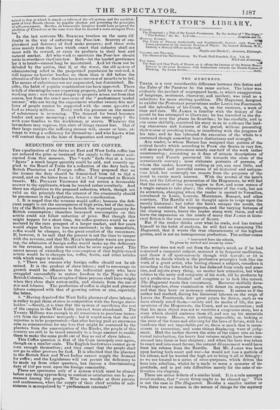REDUCTION OF THE DUTY ON COFFEE.
This equalization of the duties on East and West India coffee has not reduced the price or increased the supply to the extent anti- cipated from that measure. The" trade" finds that at a lower
"figure" a much larger quantity could be sold, and recently ap- plied to the Board of Trade for a reduction of the duty both on
British Plantation and Foreign coffee. They proposed that on
the former the duty should be diminished from 6d. to 3id. a pound, and on the latter from Is. 3d. to 7d. if imported in British
vessels. Mr. POULETT Tstostsoe did not return a favourable answer to the applicants, whom he treated rather cavalierly. And there are objections to the proposed reduction, which, though not valid on the principle that the interest of the community should be paramount in the Legislature, deserve consideration.
1. It is urged that the revenue would suffer; because the defi- cient supply is not the consequence of high price, but of the inabi- lity of the British possessions to furnish the required quantity for British consumption : therefore increased consumption on this article could not follow reduction of price. But though this might happen for a short time, the coffee-growers would be sti- mulated by the sure prospect of a larger market, and few years would elapse before the loss was recovered; in the meanwhile, coffee would be cheaper, to the great comfort of the consumers. If, however, it be said that the present is not the time to tamper with the revenue, and that Mr. RICE'S immediate wants are press- ing, the admission of foreign coffee would make up the deficiency in the revenue, and there would also be more sugar used. The surest means of extending the consumption of that highly-taxed article would be to cheapen tea, coffee, fruits, and other articles with which sugar is mixed.
2. "There are reasons why foreign coffee should not be ad- mitted. It is the product of slave labour ; and to encourage its growth would be offensive to the influential party who have struggled successfully to restore freedom to the Negro in the British Colonies.--The scruples of these persons shall have weight when they close their cotton-mills, and abstain from the use of ri3e and tobacco. The production of coffee is slight and pleasant labour compared with that of growing cotton or rice, especially the latter.
3. "Having deprived the West India planters of slave labour, it is unfair to put them at once in competition with the foreign slave- holder."—Surely, it is time that the system of sacrificing the rest of the empire to the West India interest were abandoned. The Twenty Millions was enough in all conscience to purchase immu- nity from the planters' monopoly : but it would seem that the old injustice is to be perpetuated—that after having paid an enormous sum as compensation for any loss that might be sustained by the planters from the emancipation of the Blacks, the people of this country are still to be taxed annually to a large amount to enable them to make the same profit out of free as out of slave labour. This Coffee question is that of the Corn monopoly over again, though on a smaller scale. The English landowners cannot grow corn enough themselves; and they enact that the people shall not go to other growers for food. It is admitted that the planters in the.British East and West Indies cannot supply the demand for coffee; and the Legislature will not permit the deficiency to be made up from other quarters, but impose a discriminating duty of 150 per cent, upon the foreign commodity. These are specimens only of a system which must be altered before any thing approaching to content or satisfaction can bt per- manent among the people. Who can wonder at their poverty and restlessness, when the supply of their chief articles of sub- sistence is monopolized by " predominant interests?"


























 Previous page
Previous page